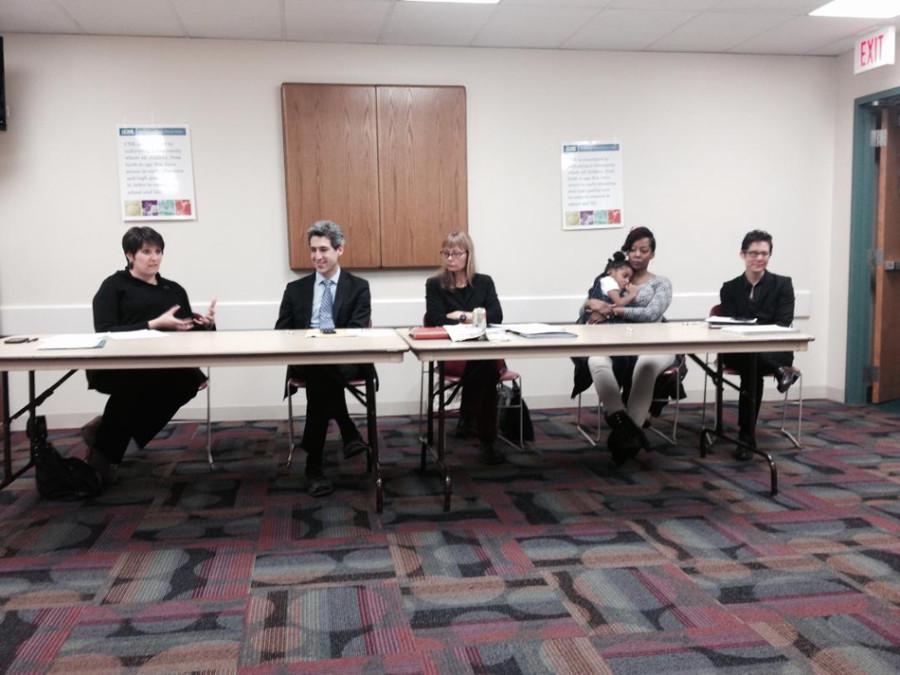Illinois debt may prevent child care centers from taking on new families
Kevin Mathew/Daily Senior Staffer
Panelists from the Illinois Senate, Childcare Network of Evanston and Illinois Action for Children discuss the child care funding crisis in Illinois. The state recently ceased funding the Child Care Assistance Fund.
February 27, 2015
State Sen. Daniel Biss (D-Evanston) and representatives from the Childcare Network of Evanston and Illinois Action for Children said Thursday that the recent stoppage of state funds for child care centers will likely prevent local centers from taking on new families.
The five speakers at Thursday’s panel discussion at the Wilmette Community Recreation Center agreed the demonstrated long-term impact of child care investment should be enough to convince lawmakers to reinstate funding. However, they said grassroots political pressure would be needed to keep services funded into the next fiscal year, which starts July 1.
The audience of about 10 expressed skepticism that high profile politicians like Illinois House Speaker Michael Madigan would value their opinion, but Biss was adamant that smaller voices mattered.
“(State Sen.) Laura Fine (D-Glenview) votes for (Madigan),” he said. “And he’ll know from your address that Laura Fine cares about you.”
The state has fully spent the available Child Care Assistance Program funds and will need to fill the $300 million gap to continue funding centers. State funding has stopped entirely, limiting local child care centers to federal funding that covers less than half the original CCAP revenue.
Sessy Nyman, the policy and strategic partnerships vice president of Illinois Action for Children, said about 400 people attended an IAFC rally in Springfield on Feb. 19. She emphasized that grassroots movements can become strong if people refuse to be intimidated by their opponent.
“There’s energy in a crowd,” she told The Daily. “We wanted to get folks together to get that energy, to know they are in this fight together.”
Childcare Network of Evanston executive director Andrea Densham said child care services are long-term investments in the community and the economy. Child care allows parents to maintain employment, healthy children and strong family relationships, she said. About 97 percent of the people CCAP supports are single parents, Nyman said.
Biss traced the “incompetence” in Illinois history before and during the financial crisis of the late 2000s. Slow or minor solutions to Illinois’ woes hit the breaking point when the CCAP began the 2015 fiscal year with a $200 million deficit, which grew to $300 million by January 2015.
State officials warned centers funding checks may come heavily delayed or potentially not at all. Centers plan to remain open, but without financial stability they will soon be forced to stop offering service to new applicants, Nyman said.
Gov. Bruce Rauner has proposed deep cuts in the 2016 budget. However, Rauner promised boosts to education funding in 2016 and a quick solution to the current crisis that has stalled investment in children. His budget address on Feb. 18 instead focused on pension reform, public universities and local income tax funding, a move predicted by Evanston officials in January.
“It appears that we are very close, literally days away, from a resolution. And every day counts,” he said in the address about the 2015 CCAP crisis. “Increasing funding for our youngest is the smart and the compassionate thing to do.”
Biss’ statement after the address claimed the budget asked too much from social services.
“The Governor’s proposal singles out working families and the most vulnerable among us for the deepest cuts, while asking nothing of the rich,” he said in his statement.
Nyman spoke Thursday of three solutions being discussed in Springfield. She said officials have recommended either providing child care services until age 6 instead of age 12, increasing user co-pays or removing funding from centers with unconventional hours.
Densham emphasized how important it is to keep child care centers open because if centers close and lose their staff and permits, reopening them would be difficult. She said CNE will do everything in its power to keep the child care services funded, but besides their monthly federal checks, they are on their own.
“What we want to do is to continue to ensure the highest quality and the greatest access, and we’ll do everything in our power to do that,” she said. “Where we are right now is trying to work each day with each family … (but) it’s very much a day by day, week by week sort of situation.”
Email: [email protected]
Twitter: @kevinwmathew


